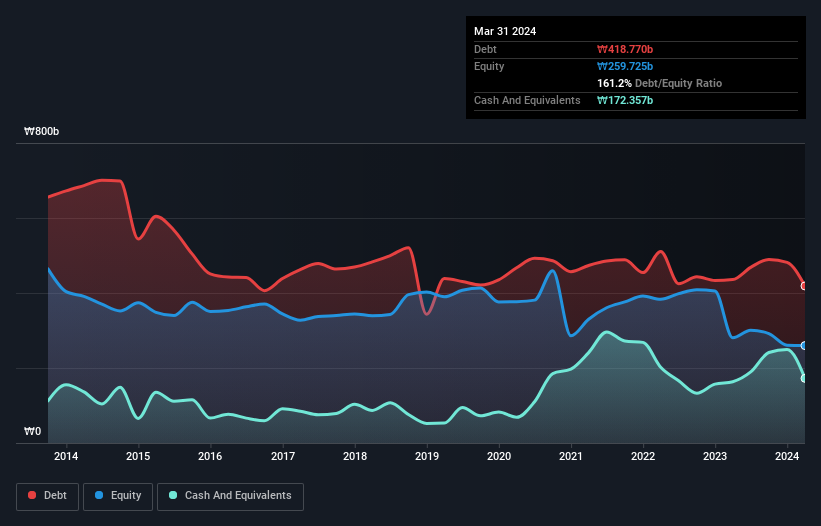
Howard Marks put it nicely when he said that, rather than worrying about share price volatility, 'The possibility of permanent loss is the risk I worry about... and every practical investor I know worries about.' When we think about how risky a company is, we always like to look at its use of debt, since debt overload can lead to ruin. As with many other companies ISU Chemical Co., Ltd (KRX:005950) makes use of debt. But the more important question is: how much risk is that debt creating?
When Is Debt Dangerous?
Generally speaking, debt only becomes a real problem when a company can't easily pay it off, either by raising capital or with its own cash flow. If things get really bad, the lenders can take control of the business. While that is not too common, we often do see indebted companies permanently diluting shareholders because lenders force them to raise capital at a distressed price. Of course, the upside of debt is that it often represents cheap capital, especially when it replaces dilution in a company with the ability to reinvest at high rates of return. When we examine debt levels, we first consider both cash and debt levels, together.
See our latest analysis for ISU Chemical
What Is ISU Chemical's Net Debt?
The chart below, which you can click on for greater detail, shows that ISU Chemical had ₩418.8b in debt in March 2024; about the same as the year before. However, it does have ₩172.4b in cash offsetting this, leading to net debt of about ₩246.4b.

How Healthy Is ISU Chemical's Balance Sheet?
Zooming in on the latest balance sheet data, we can see that ISU Chemical had liabilities of ₩622.2b due within 12 months and liabilities of ₩136.2b due beyond that. Offsetting these obligations, it had cash of ₩172.4b as well as receivables valued at ₩264.1b due within 12 months. So its liabilities outweigh the sum of its cash and (near-term) receivables by ₩321.9b.
This deficit casts a shadow over the ₩159.9b company, like a colossus towering over mere mortals. So we'd watch its balance sheet closely, without a doubt. At the end of the day, ISU Chemical would probably need a major re-capitalization if its creditors were to demand repayment. There's no doubt that we learn most about debt from the balance sheet. But it is ISU Chemical's earnings that will influence how the balance sheet holds up in the future. So when considering debt, it's definitely worth looking at the earnings trend. Click here for an interactive snapshot.
In the last year ISU Chemical had a loss before interest and tax, and actually shrunk its revenue by 8.3%, to ₩2.0t. We would much prefer see growth.
Caveat Emptor
Importantly, ISU Chemical had an earnings before interest and tax (EBIT) loss over the last year. Its EBIT loss was a whopping ₩44b. When we look at that alongside the significant liabilities, we're not particularly confident about the company. It would need to improve its operations quickly for us to be interested in it. Not least because it burned through ₩66b in negative free cash flow over the last year. That means it's on the risky side of things. When analysing debt levels, the balance sheet is the obvious place to start. But ultimately, every company can contain risks that exist outside of the balance sheet. For example - ISU Chemical has 1 warning sign we think you should be aware of.
If, after all that, you're more interested in a fast growing company with a rock-solid balance sheet, then check out our list of net cash growth stocks without delay.
New: AI Stock Screener & Alerts
Our new AI Stock Screener scans the market every day to uncover opportunities.
• Dividend Powerhouses (3%+ Yield)
• Undervalued Small Caps with Insider Buying
• High growth Tech and AI Companies
Or build your own from over 50 metrics.
Have feedback on this article? Concerned about the content? Get in touch with us directly. Alternatively, email editorial-team (at) simplywallst.com.
This article by Simply Wall St is general in nature. We provide commentary based on historical data and analyst forecasts only using an unbiased methodology and our articles are not intended to be financial advice. It does not constitute a recommendation to buy or sell any stock, and does not take account of your objectives, or your financial situation. We aim to bring you long-term focused analysis driven by fundamental data. Note that our analysis may not factor in the latest price-sensitive company announcements or qualitative material. Simply Wall St has no position in any stocks mentioned.
Have feedback on this article? Concerned about the content? Get in touch with us directly. Alternatively, email editorial-team@simplywallst.com
About KOSE:A005950
ISU Chemical
Produces and sells petrochemicals and green bio chemicals in South Korea.
Mediocre balance sheet and slightly overvalued.
Market Insights
Community Narratives




